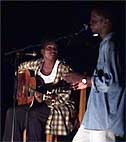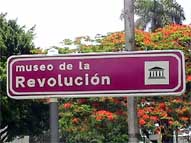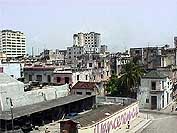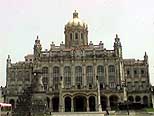|
Other Places |
|||||||||||||||||
|
|
|||||||||||||||||
|
Other Sections |
|||||||||||||||||
|
|
|||||||||||||||||
|
See also: Havana Photo Album |
||||
|
Havana is the capital of Cuba, and with 2.2 million people in its greater area, it is by far Cuba's largest city. Being the capital, Havana is the nation's center of government, and is better developed than some of the cities in outlying provinces. Havana is also an important center of industry and commerce; foreign investments are on the rise again, and Havana is at the forefront of Cuba's trade and commerce.
Like the rest of the nation, Havana has suffered greatly from the U.S. economic blockade. Many residents still live in pre-Revolution shantytowns, and new construction is only beginning to pick up again. Yet, the construction programs that are being initiated are assisted by the government and powered through grassroots community action.
As do many Cuban cities, Havana also features a great number of historic points of interest. Havana is home to what is perhaps the nation's greatest museum, the Museum of the Revolution. Blatantly tourist-oriented craft markets, restaurants, and events abound.Still, one major challenge facing the Castro government as it attempts to bulk up the nation's tourist industry is to facilitate coexistence between ordinary Cubans and tourists. Put yourself in the shoes of an ordinary Cuban. Wouldn't it be hard to understand how foreigners can come to your country, spend roughly what you earn in a day, and then leave? Cubans are generally friendly people, and the vast majority are above begging. Still, the government needs to determine the best way to earn the capital generated by tourism, while avoiding the sometimes severe social problems that it brings.
The Spanish had made a critical strategic error in Havana during this time. By concentrating their resources on new construction within the city, the left it relatively unguarded and vulnerable to attack. Indeed, the city came under serious attacks from pirates in the past, but was able to survive. The Spanish did not, however, predict an invasion by another colonial empire, and that is exactly what happened. The British were coaxed into trading Havana for Florida in the United States; thus was Spain able to regain the crown jewel of Cuba.
Though the housing situation has not yet been fully remedied, and there is still poverty, the Castro government has undeniably improved living conditions for the average Habanero (resident of Havana). This is evident in most Cubans' opinions of Castro: while few care about the government's ideological stance, most approve it because of the improvement in conditions which it has brought. These changes are as noticeable in Havana as anywhere in Cuba.
|
||||
 Havana is also an important center of culture as well as a hub for tourists and tourist attraction in its own right. Like Cuba's different areas and cities, Havana has its own unique cultural composition that can be seen through its people, art, and music.
Havana is also an important center of culture as well as a hub for tourists and tourist attraction in its own right. Like Cuba's different areas and cities, Havana has its own unique cultural composition that can be seen through its people, art, and music. Havana has a lot of potential to be developed as a tourist attraction in its own right, not just a place that tourists pass through to get to a beach resort. Havana features some of the best music and dance clubs in the country; every type of music imaginable is available, with a definite Cuban flavor. Hip-hop, jazz, Afro-Cuban rock, opera, salsa, ballad, and many other styles of music can be found at any given night in Havana.
Havana has a lot of potential to be developed as a tourist attraction in its own right, not just a place that tourists pass through to get to a beach resort. Havana features some of the best music and dance clubs in the country; every type of music imaginable is available, with a definite Cuban flavor. Hip-hop, jazz, Afro-Cuban rock, opera, salsa, ballad, and many other styles of music can be found at any given night in Havana. Havana's history is most interesting. Havana was originally founded, with a different name, on the present-day site of
Havana's history is most interesting. Havana was originally founded, with a different name, on the present-day site of  Havana continued to mature and prosper during the Spanish rule and that of various U.S.-supported dictators. The problem was that the rich were allowed to prosper, while the masses of workers were forced to accept abysmally substandard or no housing at all. Prostitution, violent crime, and every other imaginable evil ran wild through Havana.
Havana continued to mature and prosper during the Spanish rule and that of various U.S.-supported dictators. The problem was that the rich were allowed to prosper, while the masses of workers were forced to accept abysmally substandard or no housing at all. Prostitution, violent crime, and every other imaginable evil ran wild through Havana.